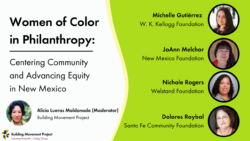Oct
22
2021
Quick Access: Recording & Transcript
Last week the Building Movement Project held a conversation with four women of color working in philanthropy in New Mexico, moderated by our New Mexico-based consultant, Alicia Lueras Maldonado. We were joined by Michelle Gutiérrez (W. K. Kellogg Foundation), JoAnn Melchor (New Mexico Foundation), Nichole Rogers (Welstand Foundation), and Dolores Roybal (Santa Fe Community Foundation), all of whom possess a range of experiences within the nonprofit and philanthropic sectors, and offered a wealth of learnings, insights, and recommendations throughout the 90-minute panel discussion.
This webinar builds on our existing work with communities and nonprofits in New Mexico, and identifies the role that philanthropy has to play in building connections with groups and communities on the ground, centering their needs, and advancing equity both in the sector and in society. We invited these four women of color to share their personal journeys into philanthropy, their processes and practices for moving money out into communities, and their bold solutions and recommendations for the future.
The Journey
Although all four women are in different roles in philanthropy, working with diverse communities, and tackling unique challenges, they all identified the desire to make change as the starting point on their journeys. JoAnn summarized this feeling succinctly by saying, “I can make a difference. I can have impact in how funding can be distributed differently in philanthropy.” Nichole added that her path into philanthropy was driven largely by identifying needs in her community, and subsequently taking steps to fill those gaps. Making change and stepping into leadership positions is not easy, as all the panelists confirmed, particularly as women of color. Dolores reflected on her more than 40 years working in the nonprofit and philanthropic sector and noted that while working conditions and culture have improved, there is still much work to be done to remove barriers for women of color. She pointed to structural barriers related to opportunity (which BMP has explored in our Race to Lead research), and confirmed that it is “a matter of identifying, naming, and removing some of those structural, racist, gender biases.”
The Process
As we moved into the part of the panel discussion focused on processes and practices that each of the panelists have for moving money out to communities and groups, we asked each of them questions specific to their experiences and current positions.
Grant-seeking organizations often wish that funders would reduce how cumbersome grant application processes can be. Dolores pointed to how foundations revised processes as a result of COVID-19, such as simplifying reporting requirements, creating multi-year grants, and offering general operating dollars. Michelle reflected on her experience working for a large global foundation and acknowledged the slowness of certain grantmaking processes, but also lifted up the opportunity she has to elevate and advocate for regional grantees at a national level. JoAnn talked about her funding philosophy and work within Native communities. As an Indigenous woman and community member, she is able to create funding opportunities that will support and sustain Native communities. As a new foundation leader, Nichole pointed to the difficulty of advocating for Black people in New Mexico, who are often erased from fundraising conversations or dismissed as a “statistically insignificant” population group in the state. As for her needs as a leader, Nichole emphasized the importance of networking and mentorship, which are vital for accessing resources and funding opportunities.
The Future
We closed out the webinar with a discussion on bold solutions for addressing leadership gaps, and the strengths and opportunities that exist within philanthropy for women of color. All of the panelists agreed on the need for mentorship, networks, and support systems for women of color leaders. Michelle added that frameworks and paradigms for leadership are often learned from a white supremacist, colonial perspective, and that they don’t align with the values of communities served or the vision of a co-liberated world. Nichole offered that sharing knowledge and wisdom freely is key to unlocking the solutions to issues that face our communities. Dolores left us with several calls to action: “Stand up for what you believe. Do not stand for injustice. Do not stand for disrespect. We have to change the culture, remove the barriers, and be bold.”
Related Resources:
- New Mexico and the Common Good Action Project (CGAP)
- On the Frontlines: Nonprofits Led by People of Color Confront COVID-19 and Structural Racism
- Race to Lead Revisited: Obstacles and Opportunities in Addressing the Nonprofit Racial Leadership Gap
- The Nonprofit Racial Leadership Gap in New Mexico: A Race to Lead Brief

